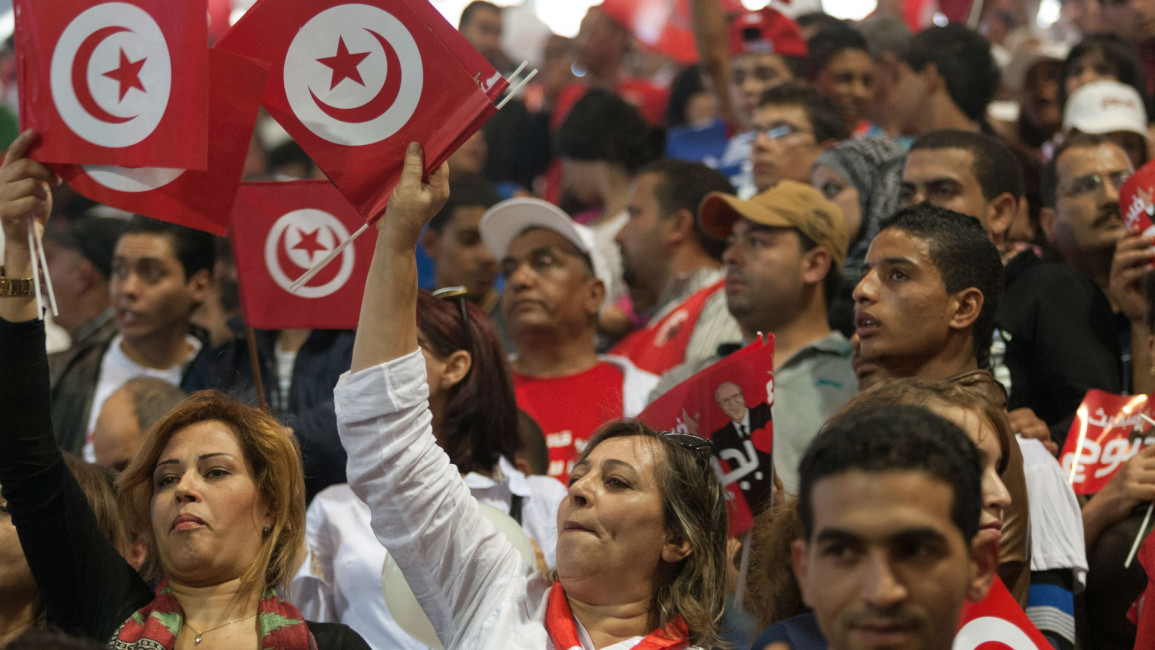Tunisia parliament holds historic first session
Tunisia parliament holds historic first session
Tunisia's new parliamentarians took the oath of office in Tuesday's inaugural parliamentary session, five weeks after they were elected to office in the country's October 26 parliamentary elections.
3 min read
Tunisia has been in the grip of election favour in recent weeks (Anadolu)
Tunisia's new parliamentarians took the oath of office in Tuesday's inaugral parliamentary session, five weeks after they were elected to office in the country's October 26 parliamentary elections.
The session is a historic moment for the North African country, marking a step in the transition to democracy following the 2011 revolution that deposed the autocrat Zine El Abidine Ben Ali, and set in motion the Arab Spring protests that have rocked the Middle East and North Africa region.
Official results from the general election gave Nidaa Tounes 86 seats, and Ennahda, a previously banned moderate Islamist movement who dominated political life in the transition period, 69.
The session began with the singing of the national anthem, after which Mustafa Ben Jaafar, the speaker of the outgoing National Constituent Assembly (NCA), a body formed in 2011 to oversee the writing of a new constitution, addressed the 217 members of parliament.
"Tunisia has managed to secure a peaceful power transfer in a fluid and civilised manner that will ensure the gradual introduction of democratic traditions," Ben Jaafar told deputies.
Ben Jaafar also urged the new parliament to immediately work on anti-terror laws and next year's budget.
The oldest member of parliament, Ali Ben Salem, was then invited to preside over Tuesday's session, along with the two youngest members of parliament.
Ben Salem, a human rights activist who served time in prison in the past, shed tears as he received a standing ovation from the parliament.
The heads of the two biggest parties, Nidaa Tounes' Beji Caid Essebsi and Ennahda's Rachid Ghannouchi, were both present at the session, but conspicuously the Tunisian president, Moncef Marzouki, was not. Marzouki's office said that he was not invited.
Marzouki is running against Essebsi in the second round of the presidential election, scheduled for late December. Marzouki, elected in 2011, came second to Essebsi in the first round.
The new parliament includes some old faces, such as prominent Ennahda figures, Abdel-Fattah Moro and Ali Laarayedh.
However, a large number of the elected members are new to politics, and come from a wide range of backgrounds, including academia, business, marketing, and medicine.
The new parliament also features a number of young people and women. Amel Souid, at 26 the youngest member of parliament, was tasked with reading out the names of all of the deputies.
The session is a historic moment for the North African country, marking a step in the transition to democracy following the 2011 revolution that deposed the autocrat Zine El Abidine Ben Ali, and set in motion the Arab Spring protests that have rocked the Middle East and North Africa region.
Official results from the general election gave Nidaa Tounes 86 seats, and Ennahda, a previously banned moderate Islamist movement who dominated political life in the transition period, 69.
The session began with the singing of the national anthem, after which Mustafa Ben Jaafar, the speaker of the outgoing National Constituent Assembly (NCA), a body formed in 2011 to oversee the writing of a new constitution, addressed the 217 members of parliament.
"Tunisia has managed to secure a peaceful power transfer in a fluid and civilised manner that will ensure the gradual introduction of democratic traditions," Ben Jaafar told deputies.
Ben Jaafar also urged the new parliament to immediately work on anti-terror laws and next year's budget.
The oldest member of parliament, Ali Ben Salem, was then invited to preside over Tuesday's session, along with the two youngest members of parliament.
Ben Salem, a human rights activist who served time in prison in the past, shed tears as he received a standing ovation from the parliament.
The heads of the two biggest parties, Nidaa Tounes' Beji Caid Essebsi and Ennahda's Rachid Ghannouchi, were both present at the session, but conspicuously the Tunisian president, Moncef Marzouki, was not. Marzouki's office said that he was not invited.
Marzouki is running against Essebsi in the second round of the presidential election, scheduled for late December. Marzouki, elected in 2011, came second to Essebsi in the first round.
The new parliament includes some old faces, such as prominent Ennahda figures, Abdel-Fattah Moro and Ali Laarayedh.
However, a large number of the elected members are new to politics, and come from a wide range of backgrounds, including academia, business, marketing, and medicine.
The new parliament also features a number of young people and women. Amel Souid, at 26 the youngest member of parliament, was tasked with reading out the names of all of the deputies.
|
| Imen Ben Mohamed and Saida Ounissi, parliament members representing Tunisians in Italy and France respectively, take a picture in the chamber. |
Muhammed Nasser, a Nidaa Tounes parliamentarian who is the party's candidate for the role of parliamentary speaker, said that he was proud of the new parliament, and of Tunisia for getting to this stage.
"This parliament was formed after a long period of difficulties and political instability," Nasser said to the private Nassma channel, "We have to be patient, be prepared, and feel responsible."
Tunisia has avoided the bloodshed ravaging other Arab Spring states such as Libya and Yemen. But it faces significant challegnes, including an extreme Islamist militant threat, a weak economy and social unrest.
Additional reporting by AFP.


![Minnesota Tim Walz is working to court Muslim voters. [Getty]](/sites/default/files/styles/image_684x385/public/2169747529.jpeg?h=a5f2f23a&itok=b63Wif2V)




![Debris near Rafic Hariri International Airport [Getty]](/sites/default/files/styles/image_330x185/public/2176162423.jpeg?h=a5f2f23a&itok=MCSK9mkM)
![An Israeli air strike on Jabalia killed teenage journalist Hassan Hamad [Screengrab/X]](/sites/default/files/styles/image_330x185/public/2024-10/hassan%20hamad1.jpg?h=c12e0b96&itok=Rd_dyCVp)
